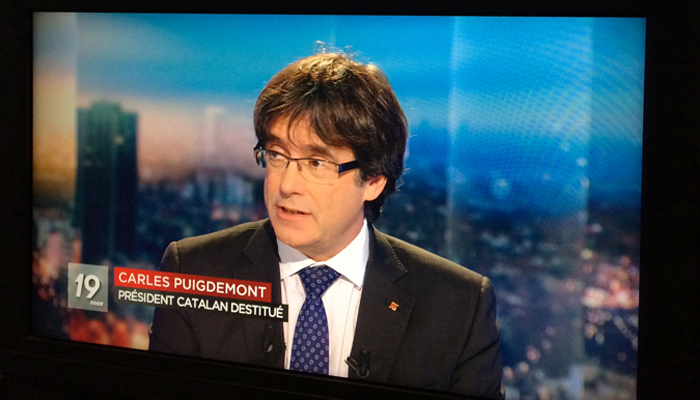Deposed Catalan leader urges separatist 'unity' for election
November 05, 2017

BARCELONA: Catalonia's deposed leader Carles Puigdemont called Saturday for separatists to unite in a December election called by Spain to quell the region's push for independence.
Puigdemont's rallying cry came a day after a Spanish judge issued an arrest warrant against him, with prosecutors seeking to charge him with rebellion, sedition, and misuse of public funds over his secessionist drive.
"The time has come for all Democrats to unite. For Catalonia, for the release of political prisoners and for the republic," he said on Twitter.
The 54-year-old has been holed up in Belgium since Monday and ignored a summons to appear before the judge in Madrid, saying he wants guarantees he will receive a fair trial.
The judge issued the European arrest warrants late Friday for Puigdemont and four of his allies — who are also in Belgium — to force them to return to Spain.
The Belgian public prosecutor's office confirmed Saturday that it had received the warrants, saying a decision would happen within 24 hours of them appearing before a judge.
But the authorities said any appeals process could last for up to three months.
"The EU Framework Decision provides that the final decision must be taken within 60 days, with an extension to 90 days under exceptional circumstances," the Belgian justice ministry said in a statement.
Illegal referendum
The warrants have further fuelled separatists' anger and frustration after deposed members of Puigdemont's government who did not flee to Belgium, including his deputy, appeared before a Spanish judge on Thursday and were detained pending a possible trial.
Protesters in the wealthy northeastern region have held frequent demonstrations, chanting and waving Catalan flags while calling for the officials' release.
A big pro-independence march, on the other hand, is planned for November 11.
Spain's deepest political crisis in decades flared up after the regional parliament in Catalonia voted to proclaim an independent republic following a referendum on October 1 that was declared illegal by the country's Constitutional Court.
The central government responded by dismissing Puigdemont's government, imposing direct rule on the region and calling new elections in Catalonia for December 21.
Puigdemont said Friday that he was ready to run as a candidate in the election — which he can do even if detained — and on Saturday, called for separatist parties to form a united front.
In a tweet, he referred to an online petition calling for the creation of a combined independent candidate list, which, by late Saturday afternoon, had received over 50,000 signatures.
During the last regional election in September 2015, Puigdemont's conservative PdeCat and the far-left ERC party stood together in a "Together for Yes" coalition.
But there have been growing tensions between the two allies over strategy and it is not clear if they will stand together again.
Separatist parties have a slim majority of 72 seats in the 135-seat parliament, and opinion polls suggest they might again win a majority in the December vote.
"It's absolutely indispensable that we have a joint strategy to battle the repression," Sergi Sabria — a spokesman for the separatist ERC party — told Catalunya Radio, in a sign the two main parties might work together.
Told of Puigdemont's unity call, Marta Rovira — the ERC's deputy leader — responded simply, "We must win (the elections) and that is what we will do."
The leaders of the far-left Popular Unity Candidacy (CUP) — another separatist party — met on Saturday in the southern French city of Perpignan and said they would make an announcement regarding the elections on November 12.
"We are studying all possibilities", party spokeswoman Nuria Gibert said.
Parties that wish to stand together in a coalition in the polls must announce this by November 7.
Whether Puigdemont and his colleagues in Brussels — Maria Serret Aleu, Antoni Comin Oliveres, Luis Puig Gordi, and Clara Ponsati Obiols — will be able to take part in the election is an open question.
The Belgian justice ministry said there were "some situations" where European arrest warrants can be refused, but added that "if the decision is to execute the (warrant), the person is in principle surrendered to the authorities of the issuing state within 10 days following the decision".
'Jailing of political opponents'
Puigdemont has repeatedly called on the international community to back him, but apart from Scotland's separatist First Minister Nicola Sturgeon criticising the "jailing of political opponents", there are no signs that other countries will recognise the independence movement.
Spain's allies in Europe have voiced steadfast support for the nation's unity and said they back the independence of the judiciary.
The 7.5 million people of Catalonia — which until this past week had considerable autonomy — are fiercely proud of their language and culture but are also deeply divided about the push for independence.
Even though Catalonia is one of Spain's wealthiest regions, Spain's central bank has warned of a possible recession in the region, where unemployment rose sharply in October.
Despite the negative economic headwinds, Peter Ceretti at the Economist Intelligence Unit said pro-independence parties might win the December election, as the jailed ministers could deliver an "important propaganda" boost.











